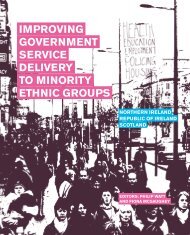4858 Mental Health Report - National University of Ireland, Galway
4858 Mental Health Report - National University of Ireland, Galway
4858 Mental Health Report - National University of Ireland, Galway
Create successful ePaper yourself
Turn your PDF publications into a flip-book with our unique Google optimized e-Paper software.
Collaborative Practice and Policy<br />
able people, who already lead the existing workload, are expected to shoulder<br />
the additional responsibilities <strong>of</strong> the cross-border project. The project<br />
management skills required to implement cross-border projects may not be<br />
available from the experience/skills base <strong>of</strong> the promotional organisations.<br />
Strategic barriers identified include the lack <strong>of</strong> a co-ordinated plan for crossborder<br />
work, which should include a sub-regional focus and a multi-sectoral<br />
approach. This plan should be underpinned by a relevant policy framework and a<br />
single control mechanism for the plan’s development budget. While there are<br />
examples <strong>of</strong> co-operation between the voluntary and statutory sectors, the level<br />
<strong>of</strong> co-operation and understanding <strong>of</strong> each other’s activities/objectives is still not<br />
sufficient to build lasting partnerships which can address issues on a cross-border<br />
basis.<br />
This evaluation goes beyond the Peace and Reconciliation Programme and makes<br />
recommendations for the future <strong>of</strong> cross-border work on the island. It takes<br />
account <strong>of</strong> the uncertain political situation as well as potential roles for emerging<br />
and evolving cross-border structures. The strategic recommendations are:<br />
• Influence policy which will be supportive <strong>of</strong> cross-border work.<br />
• The development <strong>of</strong> a co-ordinated plan for cross-border work.<br />
• The development <strong>of</strong> sub regional plans.<br />
• The promotion <strong>of</strong> greater cross-border networking.<br />
• The provision <strong>of</strong> funding for cross-border co-operation on an all-island basis.<br />
• Maintain the role <strong>of</strong> non-governmental bodies in the facilitation <strong>of</strong> crossborder<br />
work and disbursement <strong>of</strong> enabling resources.<br />
• Build on cross-border work supported by Measures 3.1 and 3.4.<br />
• Maintain the East-West dimension <strong>of</strong> cross-border work.<br />
• Raise understanding <strong>of</strong> the roles/remit <strong>of</strong> all organisations involved in crossborder<br />
work.<br />
Lessons from International Findings<br />
International collaboration has occurred in both mental health and in other<br />
health promotion activities. In 1999 the World Psychiatric Association launched<br />
‘Open the Doors’, which was the first-ever global programme against the stigma<br />
and discrimination associated with schizophrenia (Sartorius 1997, cited in WHO<br />
2001). The goals <strong>of</strong> this programme were to increase awareness and knowledge<br />
about the nature <strong>of</strong> schizophrenia and treatment options; to improve public<br />
attitudes to people who have or have had schizophrenia and their families; and<br />
to generate action to eliminate stigma, discrimination and prejudice. The World<br />
Psychiatric Association has produced a step-by-step guide to developing an antistigma<br />
programme, including reports on the experience <strong>of</strong> countries that have<br />
undertaken the programme and information from around the world<br />
on other anti-stigma efforts. The results <strong>of</strong> programmes from<br />
different countries are added to the global database so that<br />
future efforts benefit from previous experience.<br />
83
















